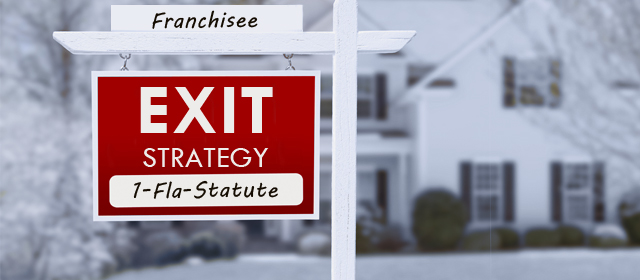Franchise 101: The Proof Is in the Writing; and Party Pauper

Franchisor 101: The Proof Is in the Writing
Ten years after the franchisor of the EXIT real estate system entered into a franchise agreement for a franchisee to operate an EXIT franchise in Maitland, Florida, the parties entered into another franchise agreement for a second EXIT location in Orlando, Florida.
Shortly after, and unknown to the franchisor, the franchisee assigned the Orlando agreement to a former Maitland manager, and was in negotiations with a competing real estate company to sell the Maitland and Orlando assets. The franchisee made repeated oral assurances to the franchisor over several months of his intent to renew the franchise agreement for a five-year term. Believing the franchisee intended to remain in the EXIT system, the franchisor allowed the franchisee to continue operating after the franchise agreement expired. Meanwhile, the franchisee tried to prolong the renewal process with false negotiation requests until the transactions for Maitland and Orlando closed.
After the franchisee sold the assets for both the Maitland and Orlando businesses, the franchisor filed suit alleging breach of contract, fraudulent misrepresentation, promissory estoppel and unjust enrichment. The trial court awarded partial judgment in favor of the franchisor for over $748,000 in damages, finding the franchisee’s representations were fraudulent promises to enter into the five-year renewal, made with a specific intent not to perform the promises at the time they were made. A Florida appellate court reversed, finding the fraud and estoppel claims arose from an unenforceable oral agreement to renew the franchise agreement, which violated the Florida statute of frauds requiring such agreements to be in writing. Stamer v. Free Fly, Inc., 2019 WL 2650238 (Fla. Dist. Ct. App. June 28, 2019).
In the appeal, the franchisee argued that the trial court erred in finding in the franchisor’s favor because the claimed oral agreement was not intended to be performed within one year, and was therefore required to be in writing under Florida’s statute of frauds. The court agreed, finding that the characterization of the oral agreement as one to simply renew the Maitland franchise agreement did not remove the agreement from the scope of the statute of frauds. Under Florida law, a party cannot avoid the writing requirement of the statute of frauds by recasting what amounts to a breach of an oral contract into a fraud claim.
It is important for franchisors to document all agreements with franchisees. As this case demonstrates, oral agreements to renew a franchise may not be sufficient to protect a franchisor’s rights, especially when dealing with holdover franchisees.

Franchisee 101: Party Pauper
Morgan Rothschild (“Rothschild”), sole owner of the Party Princess franchise system, sold a party planning franchise for the territory of Washington and promised the franchisee would achieve certain sales. Prior to the sale, Rothschild told the franchisee that he applied to register the Party Princess FDD in Washington, but the registration was not effective.
The franchisee went ahead with signing the franchise agreement and operated the franchise for several months, but never reached the sales Rothschild promised. The franchisee sued Rothschild for misrepresentation, violation of Washington’s Franchise Investment Protection Act (“FIPA”), and unjust enrichment. A Washington federal court recently granted Rothschild’s motion to compel arbitration of these claims in Colorado, pursuant to the franchise agreement’s arbitration clause. Taylor v. Rothschild, 2019 WL 3067255 (W.D. Wash. July 12, 2019).
The court originally denied Rothschild’s motion because he did not establish an enforceable arbitration agreement. In a renewed motion, the franchisee argued the arbitration provision was void in Washington because the state’s Department of Financial Institutions (“DFI”) issued an interpretive opinion that a franchisor could not require a franchisee to arbitrate outside of Washington. The court disagreed, concluding a DFI interpretive opinion is not a rule or order, and cannot render an otherwise valid arbitration clause void.
A franchise regulatory agency like Washington’s DFI is empowered to make binding rules. But deference by courts to interpretations from the agency is not automatic. The binding power and effect of an agency’s interpretation of a statute or regulation usually depends on context and other factors.
Attorneys who litigate franchise disputes, and intend to rely on agency interpretive opinions, should understand the interplay between the agency’s interpretive opinion and the applicable deference standard of the state or federal court tasked with applying it.
Franchisees should carefully read the dispute resolution provisions of their franchise agreements and understand that they may be required to litigate or arbitrate disputes in an inconvenient forum.